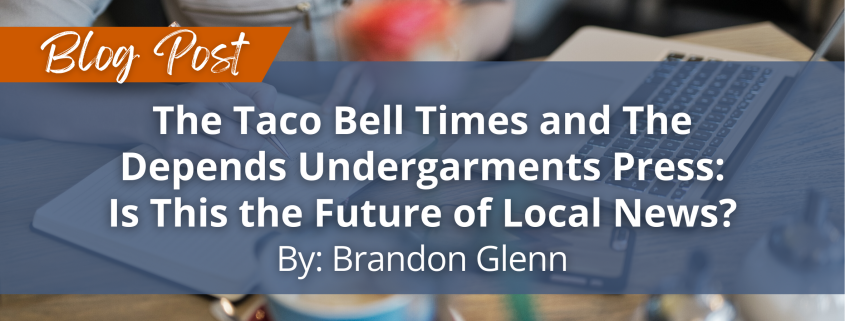The sad state of local news in the U.S. is hardly news to anyone who has spent time in public relations and journalism.
News outlets across the nation are continually going out of business, creating “news deserts” where communities are largely devoid of any reliable sources of credible information.
Though often overlooked, local news outlets can be valuable resources for public relations professionals and their clients. Whether they are general interest dailies, weeklies, or business publications, these media outlets are often interested in milestone topics that don’t necessarily appeal to trade or national media, such as hiring plans, headquarters’ expansions, acquisitions, and other factors that may affect the local economy.
Over the last 15 years, ”the local news crisis has metastasized like a slow-moving cancer coursing through the bloodstream of enclaves from suburbia to rural America,” as a recent report on the state of local news from Northwestern University’s Medill School so eloquently phrased it.
The report is full of stark and sobering numbers and facts. For example:
- The nation has lost one-third of its newspapers and two-thirds of its newspaper journalists since 2005
- An average of 2.5 newspapers closed each week in 2023
- Roughly half of all U.S. counties are now only served with one remaining local news source — typically a weekly newspaper
- Most communities that lose a local newspaper typically do not get a replacement, even online
The decline of local news should be concerning for anyone who cares about democracy, good governance, and public accountability. Why? Studies have shown that the decline in local news has increased political polarization, led to more political corruption, and let outlets that spread misinformation fill the void, the AP reported.
Indeed, this dearth of reliable, community-level information “poses a far-reaching crisis for our democracy as it simultaneously struggles with political polarization, a lack of civic engagement, and the proliferation of misinformation and information online,” the Northwestern report states.
Wealthy corporations to the rescue? What could go wrong?
Against the backdrop of this escalating existential crisis for local news, I was interested to read a proposal by marketing thought leader extraordinaire Joe Pulizzi, founder of the Content Marketing Institute, who suggests that newspapers should follow the model of sports teams selling stadium naming rights to private companies.
Pulizzi throws out the example of his hometown Cleveland Plain Dealer, struggling with a barely there print product and less-than-attractive website, selling its naming rights to local megacorporation Progressive Insurance. Pulizzi notes that Progressive pays $3.6 million a year for the naming rights for the Cleveland Guardians’ stadium, while it spent $1.37 billion on advertising in 2022, so another $3 million to sponsor a newspaper represents the equivalent of loose pocket change for the insurance giant.
It’s an intriguing idea and one that we could see experimented with around the country, though as Pulizzi correctly notes, “A key challenge in making this concept a reality is ensuring mutual expectations are met for the businesses receiving such subsidies.”
Ahh, yes, there’s the potential problem. In other words, what kind of deference might Progressive’s executive suite and board of directors expect from The Progressive Plain Dealer when they object to the tone of its editorial coverage?
Corporate sponsorship would create a minefield of ethical challenges for journalists, the communities that rely on them for information, and corporate executives. If the past is any indication, this will not end well for journalists and their communities.
In my decade or so of experience as a business journalist one thing became abundantly clear: People who have accumulated a substantial amount of wealth, power, and influence will virtually always use that wealth, power, and influence to further their own interests. In a sense, they can’t help themselves. What’s the point of rising to power if you can’t use that power?
So, returning to the Progressive Plain Dealer example, what happens to the outlet’s news coverage when Progressive suffers an embarrassing public relations gaffe? What if the CEO’s country club buddy gets popped for a DUI? What if a political candidate the CEO is personally backing is shown to have used campaign funds to pay hush money to a porn star?
In all these scenarios, and countless others we could imagine if we took the time, I would virtually guarantee you that Progressive would use its funding, and the threat of revoking it, to try to slant the news outlet’s coverage in a way that is more favorable to Progressive’s viewpoint and business interests. The community would sense and suspect this, damaging the Progressive Plain Dealer’s credibility with its readers, and potentially plunging us back into the local news crisis all over again. Alas, cash rules everything around me, as some wise philosophers once reminded us.
Nonetheless, I applaud the creativity in seeking out solutions to the local news dilemma and may soon have little choice but to welcome our new corporate news overlords.
